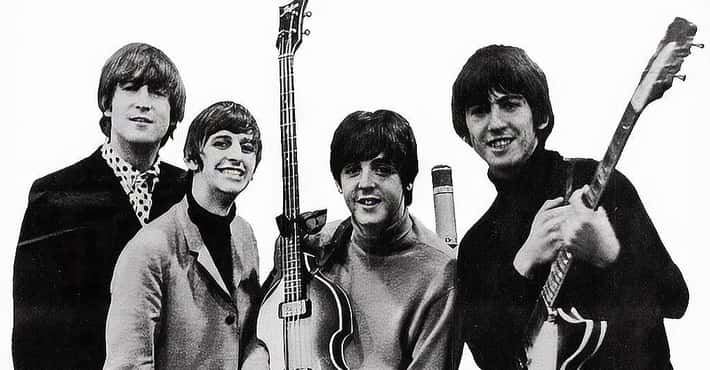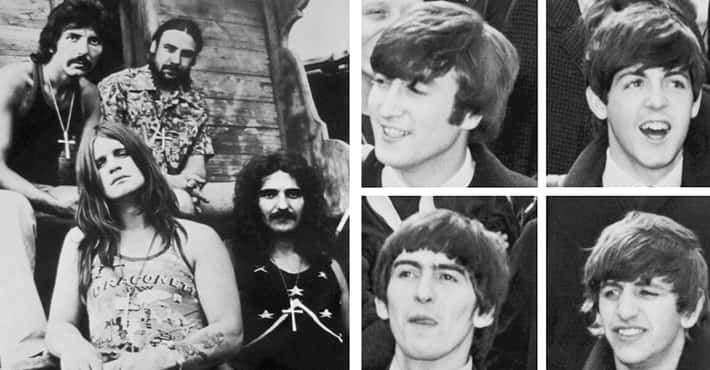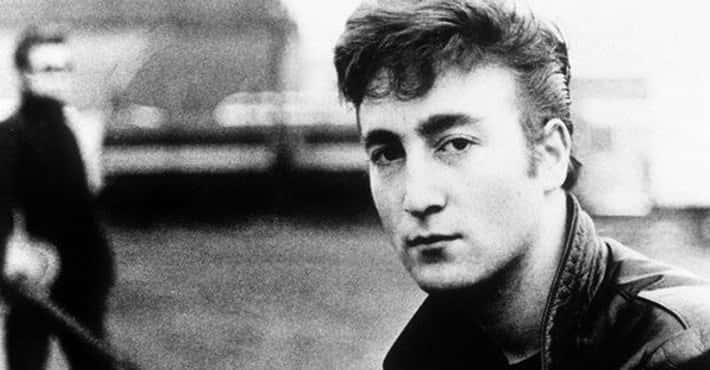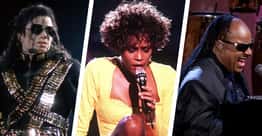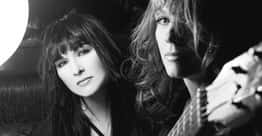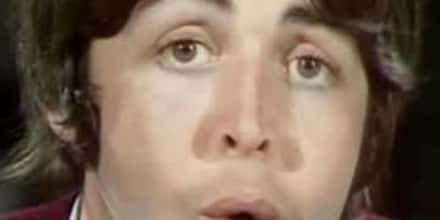10 Easter Eggs And Hidden Details In Beatles Songs
Copy link
Vote up the most interesting or surprising Easter Eggs from Beatles songs.
The Beatles are the most famous rock band of all time, not only because of the quality of their songs, but also because of how they infiltrated the public consciousness.
One technique they used to live in our minds rent-free was creating the impression they knew more than they let on. Extra layers of coded meaning seem to exist in Beatles verbiage - from the songs themselves to the album covers. As often as not, this effect is illusory or accidental; John Lennon, in particular, was scornful of those who scoured Beatles songs for deep meaning.
Still, it can be fun to explore these Easter eggs - and, if nothing else, it provides an excuse to revisit some classic tunes.
The original vinyl LP of Sgt. Pepper's Lonely Hearts Club Band contains a “run-out groove,” the purpose of which is to let the record player needle run in a continuous loop on players that don't have an automatic return function. It also happens to be the perfect location for a hidden track.
For Sgt. Pepper's run-out groove, the Beatles and their technicians spent hours standing around microphones chatting and singing bits of songs. From this, a few seconds of chaotic audio were mixed together.
The eerie mini-track includes what sounds like a high-pitched voice saying, “Never could be [see?] any other way.”
- Photo:
- Magical Mystery Tour
- BBC1
“I Am The Walrus” concludes with a fade-out that evokes the feeling of switching frequencies on the radio. How was this achieved? Partly by including actual audio from live radio broadcasts in the mix. As John Lennon recalled later:
When I was mixing the record, I just heard a radio in the room that was tuned to some BBC channel all the time, and we did about, I don’t know, half a dozen mixes, and I just used whatever was coming through at the time.
He didn't know it at the time, but the broadcast was a performance of William Shakespeare's King Lear. The snippet in the song is from Act 4, Scene 6:
Oswald: Slave, thou hast slain me. Villain, take my purse.
If ever thou wilt thrive, bury my body
And give the letters which you find'st about me
To Edmund, Earl of Gloucester. Seek him out
Upon the English party. O, untimely death!
Death! [He dies]Edgar: I know thee well: a serviceable villain,
As duteous to the vices of thy mistress
As badness would desire.Gloucester: What, is he dead?
Edgar: Sit you down, father. Rest you.
More I Am the Walrus- #34 of 200 onThe Best Beatles Songs, Ranked By Fans
- #1088 of 2,060 onThe Best Songs Of All Time, Ranked
- #39 of 67 onThe Most Underrated Beatles Songs
- Photo:
- Photo:
- Kurt Schollenberger / ETH Library
- Wikimedia Commons
- CC-BY-SA 4.0
Paul McCartney's reggae-inflected White Album track tells the tale of Desmond and Molly Jones, who get married, have kids, and run a stall in the marketplace - all as “life goes on, brah.” In the single “Ob-La-Di, Ob-La-Da,” the final verse of this seemingly simple tale has an unexpected twist:
Happy ever after in the market place
Molly lets the children lend a hand
Desmond stays at home and does his pretty face
And in the evening, she's a singer with the band.Is Desmond a cross-dresser? It's right there in the lyrics. This wasn't an intentional part of the story, however. McCartney made a mistake when singing the lyrics, then left it in because he liked its ambiguity. It's on-brand for a band that was always receptive to happy accidents. As McCartney noted:
One of the things about The Beatles is that we noticed accidents. Then we acted upon them. When we had a tape playing backwards by accident, we would stop and go, “What is that?” A lot of other people would go, “Oh God, what is that bloody noise?” But we always loved being sidetracked by these ideas.
- Photo:
In June 1967, the BBC broadcast Our World, a live program sent around the world via then-new satellite technology and designed to showcase the possibilities of global communication. Featuring contributions from numerous nations, it culminated in a performance of a new Beatles song - “All You Need Is Love” - which John Lennon had written expressly for the broadcast.
Recorded in the middle of the Summer of Love - and only weeks after the release of Sgt. Pepper's Lonely Hearts Club Band had rocked the world of pop music - the broadcast, seen by some 170 million viewers at the time, represented a highwater mark in the “peace and love” era. As Ringo Starr recalled:
We were big enough to command an audience of that size, and it was for love. It was for love and bloody peace. It was a fabulous time. I even get excited now when I realise that’s what it was for: peace and love, people putting flowers in guns.
Besides its catchy tune and timeless message, the track also features several musical quotations. It begins with brass instruments playing France's national anthem, “La Marseillaise.” The extended sing-along ending weaves in snippets of Glenn Miller's “In The Mood,” J.S. Bach's “Two-Part Invention in F Major,” the English folk song “Greensleeves,” and the Beatles' own “She Loves You.”
- Photo:
- Henry Grossman
- Wikimedia Commons
- Public domain
John Lennon found it amusing that fans - and even scholars - would pick apart Beatles lyrics for hidden meaning, and he sometimes wrote deliberate nonsense just to thwart their efforts.
In the White Album track "Glass Onion," Lennon takes a different tack. Rather than writing nonsense, he deliberately references earlier songs, slyly hinting that there are, in fact, hidden meanings. But it's all tongue-in-cheek – another way to (in modern parlance) troll his fans:
I told you about Strawberry Fields
You know the place where nothing is real
Well, here's another place you can go
Where everything flows[…]
I told you about the walrus and me, man
You know that we're as close as can be, man
Well, here's another clue for you all
The walrus was Paul[…]
I told you about the fool on the hill
I tell you, man, he's living there still
Well, here's another place you can be
Listen to me- Photo:
John Lennon's “Sun King” is a short track that serves as the second part of the medley on the B-side of Abbey Road. The second half of this languid, dreamy song features nonsense lyrics in a faux-Romance language that sounds like Spanish or Italian. One phrase Lennon works in here is “chicka ferdy,” which has its own history in Liverpool. As Paul McCartney later revealed:
There was a thing in Liverpool that us kids used to do, which was instead of saying “f*ck off,” we would say “chicka ferdy.” We were thinking that nobody would know what it meant, and most people would think, “Oh it must be Spanish,” or something. But we got a little seditious word in there!
More Sun King- #174 of 200 onThe Best Beatles Songs, Ranked By Fans
- #1002 of 2,060 onThe Best Songs Of All Time, Ranked
- #10 of 57 onThe Best Songs With King in the Title
- Photo:
- Universal Pictures
- Wikimedia Commons
- Public domain
The 1966 album Revolver marks a shift not only in the kind of music the Beatles made, but in the kind of drugs they were using. From the Scotch-and-Coke days of Please Please Me to the pot-infused aura of Help!, we move to the period where all the band members experimented, at least a little, with LSD.
You can hear it in the psychedelic stylings of songs like “Tomorrow Never Knows” and “She Said She Said.” The latter, in fact, is a veiled account of a Los Angeles party in which John Lennon was tripping and got freaked out by actor Peter Fonda.
On August 24, 1965, while touring in the US, the Beatles spent a day using acid in a rented Los Angeles house with two members of the Byrds. Fonda, also tripping, dropped by, but according to Lennon, he was seriously ruining the vibe:
He was describing an acid trip he’d been on. We didn’t want to hear about that! We were on an acid trip and the sun was shining and the girls were dancing and the whole thing was beautiful and Sixties, and this guy - who I didn’t know; he hadn’t made Easy Rider or anything - kept coming over, wearing shades, saying, “I know what it’s like to be dead,” and we kept leaving him because he was so boring!
For his part, Fonda said he was trying to reassure George Harrison, who appeared frightened by the experience:
I told him there was nothing to be afraid of and that all he needed to do was relax. I said that I knew what it was like to be dead because when I was 10 years old I’d accidentally shot myself in the stomach and my heart stopped beating three times while I was on the operating table because I’d lost so much blood.
The song was originally called “He Said He Said,” but Lennon did a gender-swap for the final version.
- Photo:
On August 27, 1967, the Beatles's manager Brian Epstein passed unexpectedly. For the band members, who had relied on him not only to handle their business affairs but also to be a sort of father figure and guiding light, it left them adrift in uncharted waters.
The band set up a new business wing, Apple Corps, but it was a mess that hemorrhaged money. By early 1969, John Lennon, Ringo Starr, and George Harrison decided the Beatles should hire industry shark Allen Klein - former manager of the Rolling Stones - to get their books in order. Paul McCartney was the only holdout; he profoundly distrusted Klein and wanted to put his future father-in-law, Lee Eastman, in the role.
McCartney channeled his frustrations into “You Never Give Me Your Money,” the track that kicks off the famous “B side medley” of the Beatles' last-recorded album, Abbey Road. McCartney recalled:
This was me directly lambasting Allen Klein’s attitude to us: no money, just funny paper, all promises and it never works out. It’s basically a song about no faith in the person, that found its way into the medley on Abbey Road. John saw the humour in it.
“Happiness Is a Warm Gun” is one of the more inscrutable tracks in the Beatles catalogue, and these lyrics are particularly difficult to parse:
The man in the crowd with the multicoloured mirrors
On his hobnail boots
Lying with his eyes while his hands are busy
Working overtime
A soap impression of his wife which he ate
And donated to the National TrustAlthough the song is mostly a John Lennon creation, Beatles press agent Derek Taylor assisted with the lyrics. The man with mirrors on his boots refers to a man Taylor read about in the news, who had been arrested for using such mirrors to look up women's skirts.
As for the donation to the National Trust, Taylor recalls:
The eating of something and then donating it to the National Trust came from a conversation we’d had about the horrors of walking in public spaces on Merseyside, where you were always coming across the evidence of people having crapped behind bushes and in old air-raid shelters. So to donate what you’ve eaten to the National Trust was what would now be known as “defecation on common land owned by the National Trust.”
- Photo:
- Joost Evers / Anefo
- Wikimedia Commons
- Public domain
By the time sessions for the White Album were underway, Yoko Ono was becoming a fixture in the recording studio. Not everybody knows, though, that she actually performed on a Beatles track.
“The Continuing Story of Bungalow Bill,” the closest Lennon ever came to penning a straight-up (albeit slightly twisted) children's song for the Beatles, is a tongue-in-cheek tale about a man who likes to hunt big game with his mother tagging along. One verse goes:
The children asked him if to kill was not a sin
“Not when he looked so fierce,” his mummy butted in
"If looks could kill it would have been us instead of him"Ono sings “Not when he looked so fierce” solo, and duets with Lennon on the next line. This is the only instance of a female lead vocal on a Beatles recording.
- Photo:













